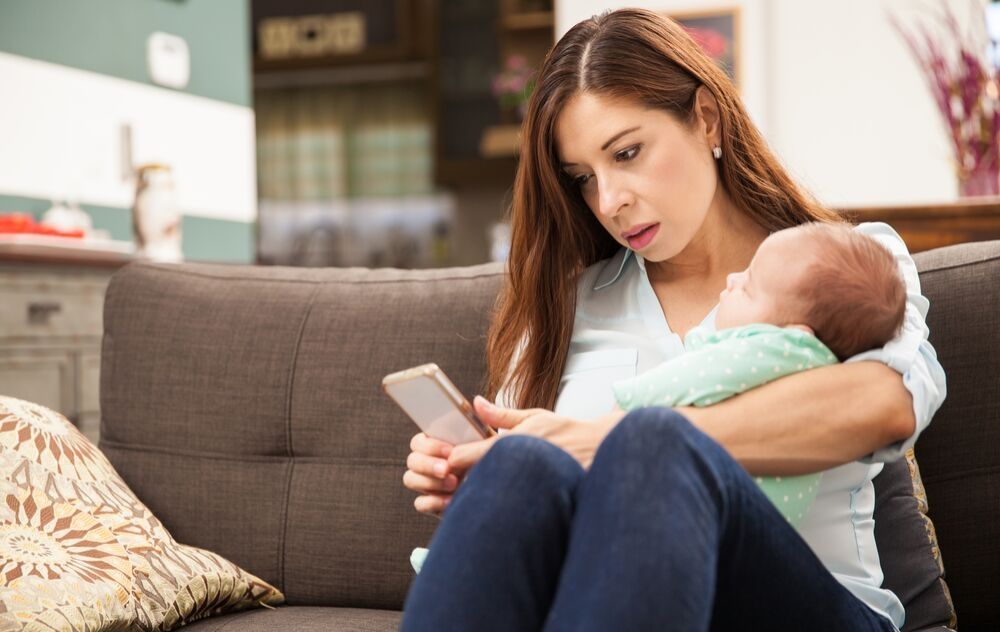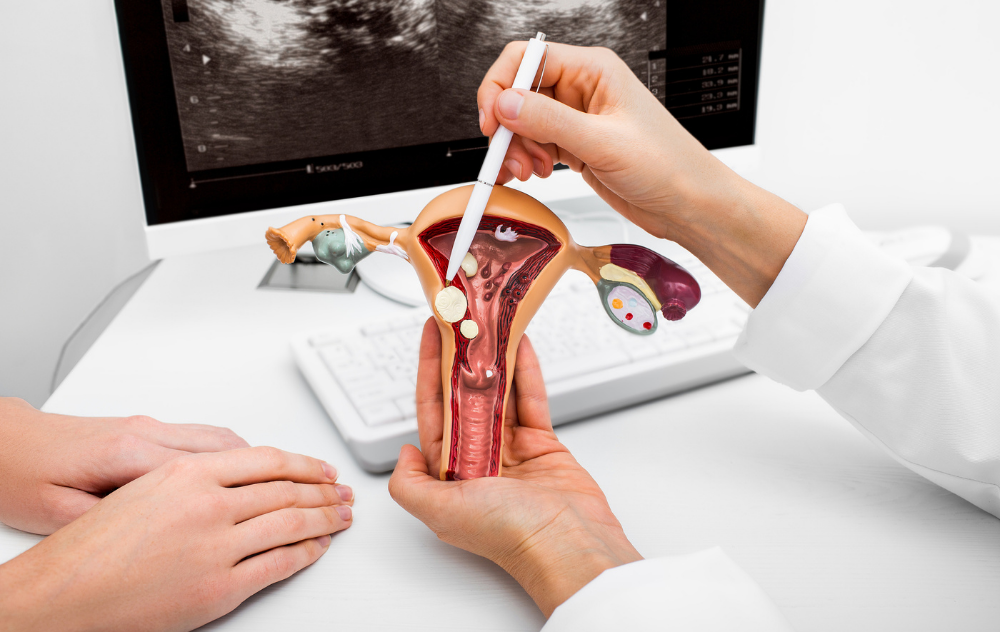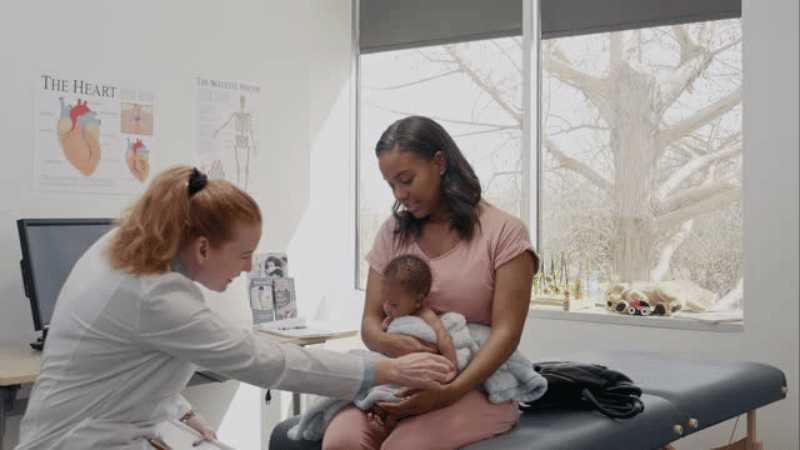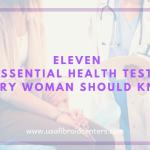
Pregnancy is a life-changing experience that teaches women about their bodies’ ability to nourish and deliver a baby. Women go through many changes during pregnancy, including increased breast size, weight gain, hair loss, food aversions or cravings, or fluid retention.
After pregnancy, it may take a woman’s body a while to adjust to postpartum life and the first period after pregnancy. Fibroids are benign growths on or inside the uterus, which can affect your periods and cause discomfort with heavy bleeding, severe cramping, and longer periods.
A major change during pregnancy is the 9-month pause in menstruation. How and when your period after pregnancy returns depends on a few different factors, but you may be asking whether it will be different and if fibroids will affect your period after pregnancy.
Fibroids can also influence your period before and after you become pregnant, so it’s important to be aware of tell-tale symptoms.
Talk to a Fibroid Specialist Now
Your First Period After Pregnancy
If you are wondering how your period changes after pregnancy, there is no hard and fast rule about when menstruation will begin after the birth of a child. However, the biggest influence on when your period will start is breastfeeding.
Women who exclusively breastfeed their babies, meaning they do not supplement with formula, will generally not have their period for a few months up to the entire time they breastfeed. For women who do not breastfeed or breastfeed but supplement with formula, their periods usually return between four to eight weeks after childbirth.
You may be wondering why breastfeeding has such a strong influence on your menstruation. When women lactate their bodies produce prolactin, a hormone essential to the production of breast milk.
Prolactin can interfere with reproduction hormones resulting in your body not ovulating or releasing eggs. You will not have a period if your body does not release an egg for fertilization. This reaction to the prolactin hormone has been thought of as your body’s way to prevent pregnancy so your baby can receive all of the nutrients from your breast milk.
One thing to keep in mind is that just because you have not had your period after childbirth does not mean you cannot become pregnant.
Before you period returns you will ovulate which means you will be able to conceive. Talking with your doctor is an important step during this time.
The First Period
If you are wondering about the changes to your period after pregnancy, there is no hard and fast rule about when menstruation will begin after the birth of a child.
However, the biggest influence on when your period after pregnancy will start is breastfeeding.
Women who exclusively breastfeed their babies and do not supplement with formula, will usually go without a period after pregnancy for a few months up to the entire time they breastfeed. Women who do not breastfeed or who supplement breastfeeding with formula commonly get their periods after pregnancy between four to eight weeks after giving birth.
Did you know breastfeeding has a strong influence on your menstrual cycle and period after pregnancy?
When women lactate or produce milk, their bodies produce prolactin, a hormone essential for breast milk production. Prolactin can interfere with reproduction hormones resulting in your body ceasing to ovulate or release eggs.
You will not have a period after pregnancy if your body does not release an egg for fertilization. This reaction to the prolactin hormone has been thought of as your body’s way to prevent pregnancy so your baby can receive all of the nutrients from your breastmilk.
However, just because you have not had your period after pregnancy does not mean you cannot become pregnant. Before your period returns, you will ovulate, which means you will be able to conceive. Talking with your doctor about birth control is an important step.
During pregnancy, your body makes adjustments to promote the healthy growth of your baby. Still, after pregnancy, your body begins to prepare itself for ovulation so you can conceive another child.
However, your body will probably not be completely healed from childbirth before your period after pregnancy begins again.
As the baby grows, so does your uterus, and it can take months for your uterus to return to its’ pre-baby size. The change in your uterus creates more uterine lining, and when your period after pregnancy comes, it means more uterine lining needs to be shed.
This can cause a variety of uncomfortable or painful symptoms, such as:
- Changes in cramping (stronger or lighter than pre-pregnancy)
- Passing of small blood clots
- Heavier flow
- Periods that seem to stop and start again
- More pain than usual
- Longer or shorter periods than before pregnancy
It is important to keep in mind that while these symptoms are common, everyone does not experience them. Some women report that their first period after pregnancy was not different or their menstrual symptoms improved. Like pregnancy, every woman will have a different experience when her period after pregnancy returns.
If you think your periods are not “normal,” we encourage you to take our symptom-checker quiz to determine if you have uterine fibroids.
Period Complications After Pregnancy
After pregnancy, your period may fluctuate and change quite a lot, making it difficult to know what is considered normal and abnormal. Consulting your doctor and monitoring your symptoms is important to determine if it’s just your body returning to your regular period or if it could be an underlying condition.Most women’s periods regulate after a few months, but they may develop complications with their periods. The most common reasons are:
- Fibroids: non-cancerous tumors that develop in the uterine wall and can cause symptoms like heavy bleeding, painful periods, or abdominal pain.
- Adenomyosis: the endometrium (uterus inner-lining) grows into or within the uterine wall causing painful or heavy periods.
- Sheehan’s syndrome: severe blood loss damages the pituitary gland and prevents your ovaries from functioning properly, reducing or stopping your periods.
- Asherman’s syndrome: scar tissue that forms in the uterus or cervix and causes them to stick together and shrink the size of your uterus.
These period conditions are not the only complications that can occur after childbirth. This is why women need to pay attention to their bodies to avoid any serious conditions. If you experience any of the following symptoms during your period, contact your doctor immediately:
- Sudden fever
- Passing blood clots that are bigger than a golf ball
- Bleeding through one pad or tampon every hour
- Severe headache or trouble breathing
- Painful urination or urinating frequently
- Extreme fatigue (which can be caused by anemia)
- Severe or sudden pain during bleeding
- Pain during intercourse
Fibroids After Pregnancy
According to a recent study, 1 30% of 4,500 women who had fibroids during pregnancy said they experienced bleeding and pain during their first trimester.
This is why it’s important to be in contact with your doctor to monitor your fibroids’ growth. Pregnancy induces estrogen production, which can sometimes cause fibroids to change in size.
Fibroids can also affect your period before and after pregnancy. Symptoms may come and go in waves, making women think their fibroids have gone away. However, many women find their fibroid symptoms have become worse after pregnancy.
Therefore, it’s important to see a specialist for fibroids after pregnancy to see if you are a candidate for treatment of fibroids after pregnancy. If you want to learn more about pregnancy and uterine fibroids, visit our page below.
Pregnancy and Uterine Fibroids
Do Fibroids Shrink After Pregnancy?
Fibroids can shrink after pregnancy in both volume and size. A study by NCBI showed that 70 percent of the women observed after giving birth saw fibroids shrink by over 50 percent.
Many women see their fibroids after pregnancy shrink back to their size before pregnancy.
Fibroids often grow during pregnancy because of the increase in hormones. Once a woman gives birth, her hormone levels drop, which can cause the fibroids after pregnancy to stop growing and potentially regress.
Do Fibroids Shrink After Miscarriage?
The link between shrinking fibroids and miscarriages isn’t as clear as a live birth. Fibroids can shrink after a woman has a miscarriage instead of live birth, but the time of the miscarriage can make a difference.
A study showed that women whose miscarriages happened before eight weeks were less likely to see their fibroids after pregnancy shrink than those who had miscarriages after eight weeks. According to this study, the longer the pregnancy before miscarriage, the more the fibroids regressed.
Fibroids After Pregnancy and Breastfeeding
Studies have shown a correlation between fibroids after pregnancy and breastfeeding, but they are inconclusive.
A study in 2019 indicates that women may have a regression of fibroids after pregnancy if they are breastfeeding. This study had less than 160 participants, making for a small sample. Breastfeeding has many benefits, and fibroid regression may be another advantage.
Treating Fibroids and Adenomyosis After Pregnancy
Life after pregnancy can be a challenging transition, so you shouldn’t worry about your periods. If you are experiencing any complications regarding fibroids and your period after pregnancy, make time to speak with your doctor about your treatment options.
At USA Fibroid Centers, we specialize in non-surgical uterine fibroid and adenomyosis treatment. Our Interventional Radiologists are experienced in providing care for women suffering from painful uterine fibroid or adenomyosis symptoms.
Take control of your body and find relief from your symptoms to get back to what matters: You and Your Family!
Visit our website at www.usafibroidcenters.com or call us at 855-615-2555 to schedule your consultation today.




